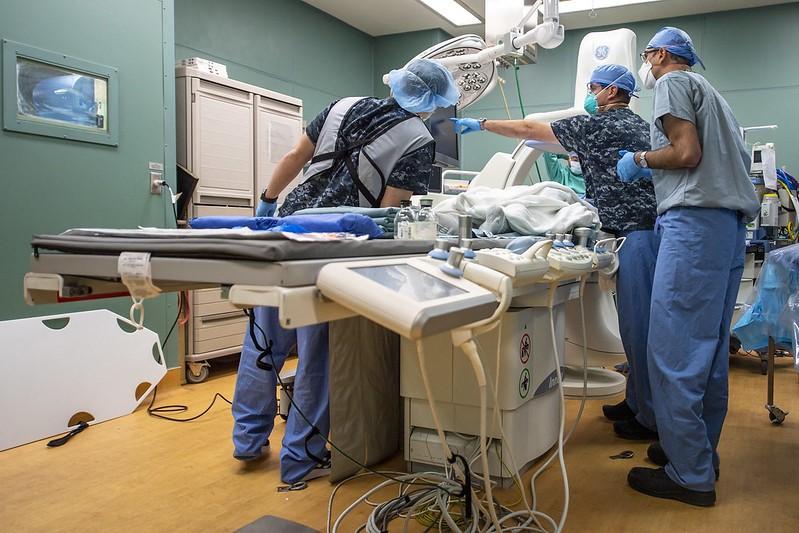Vanderbilt University researchers have found a link between delaying surgery after COVID-19 infection and a lower risk of major postoperative cardiovascular complications today in JAMA Network Open.
The team evaluated the association between time to surgery after COVID-19 diagnosis and the risk of major postsurgical cardiovascular events within 30 days among 3,997 previously infected adult patients at Vanderbilt from Jan 1, 2020, to Dec 6, 2021. Major complications included deep vein thrombosis (DVT; blood clot), pulmonary embolism (blood clot in the lungs), stroke, heart attack, acute kidney injury (AKI), and death.
Median patient age was 51.3 years, 16.7% were Black, 74.8% were White, and 8.5% were of other races. Median time from COVID-19 diagnosis and surgery was 98 days, and 34.9% of patients underwent surgery within 7 weeks of COVID-19 diagnosis.
Vaccination didn't alter findings
At the time of testing, 2,350 patients (58.8%) had symptomatic infections, and 1,539 (38.5%) were symptom-free; the symptom status of the remaining 108 cases (2.7%) was unknown.
A total of 485 patients (12.1%) had major postoperative cardiovascular complications. Increased time between infection and surgery was tied to a lower rate of complications (adjusted odds ratio [aOR], 0.99), a trend that persisted for the 1,552 patients who had received one or more COVID-19 vaccine doses (aOR, 0.98 per 10 days).
The incidence of any adverse cardiovascular event fell steeply at first, from approximately 18% to 10% over the first 100 days after COVID-19 diagnosis, then steadily declined over the next 10 months, reaching roughly 8% after 400 days, regardless of vaccination status.
Sixty-one patients (1.5%) developed DVT, 16 (0.4%) had a pulmonary embolism, 29 (0.7%) had a stroke, 116 (2.9%) had a heart attack, 363 (9.1%) were diagnosed as having AKI within 30 days after surgery, and 79 patients (2.0%) died.
We were surprised to find a trend of subsiding risk still discernible more than a year after COVID diagnosis.
Factors associated with elevated risk of an adverse cardiovascular event were older age (aOR, 1.13), male sex (aOR, 1.51), Black race (aOR, 2.01 [vs White race]), higher American Society of Anesthesiologists (ASA) classification (aOR, 2.43), ASA emergency status (aOR, 1.49), urologic procedure (aOR, 1.98), and any of eight Elixhauser comorbidities (cardiac rhythm abnormalities, neurodegenerative disorders, kidney failure, lymphoma, solid tumor, coagulopathy [tendency toward blood clots], weight loss, and fluid and electrolyte disorders.
Doctors, patients should consider timing
The researchers noted that more than 28 million surgeries around the world have been cancelled or delayed because of active COVID-19 infections. Based on recent data suggesting a higher death rate for patients who undergo surgery within 6 weeks of infection, the ASA and the Anesthesia Patient Safety Foundation recommend postponing surgery for 4 to 12 weeks after diagnosis, depending on COVID-19 severity and vaccination status.
While SARS-CoV-2 mainly affects the pulmonary system, it also can cause endothelial (blood-vessel lining) dysfunction, vascular inflammation, and blood clots, all of which are believed to lead to higher rates of cardiovascular complications, the researchers noted.
"Furthermore, regional inflammation and cytokine release have been linked with pulmonary complications, myocardial injury, and acute kidney injury (AKI)," they wrote. "Taken together, these associations present a substantial potential mortality risk for surgical patients, who experience additional inflammatory activation as a result of their operation."
In a Vanderbilt news release, senior author Robert Freundlich, MD, said that the study was different from others in that it tracked surgical outcomes more broadly and over a longer time since COVID-19 diagnosis.
"We were surprised to find a trend of subsiding risk still discernible more than a year after COVID diagnosis," he said. “In a given patient’s case, many considerations can influence when surgery should best occur, and our results provide further indication that doctors and patients would do well to include proximity to COVID in their thinking.”
The researchers called for further research to determine the effect of dynamic COVID-19 management and newer viral variants on the detected association.





















